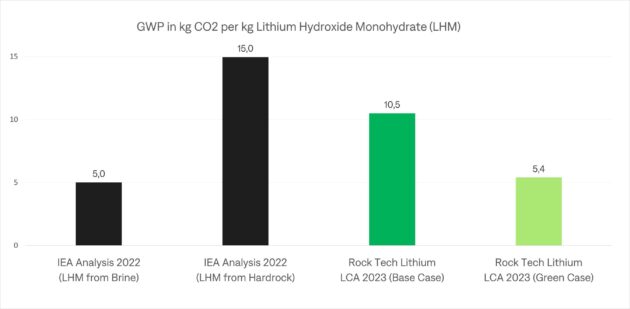
Rock Tech’s Guben Converter lithium production carbon footprint is 30 per cent lower than the IEA’s reported average
by CM staff

Fraunhofer UMSICHT conducted a Life Cycle Assessment for battery-grade lithium hydroxide monohydrate from the Guben Converter.

Rock Tech’s Guben Converter Lithium Production Carbon Footprint is 30 Percent Lower than the International Energy Agency’s Reported Average.
Fraunhofer UMSICHT conducted a Life Cycle Assessment (LCA) and calculated the carbon footprint to 10.5 kgCO2-eq./kg LHM. The footprint could be reduced to 5.4 kgCO2 eq./kg LHM through careful commercial selection. (CNW Group/Rock Tech Lithium Inc.)
VANCOUVER — Rock Tech Lithium shared the findings of a Life Cycle Assessment (LCA) for battery-grade lithium hydroxide monohydrate (LHM) from its planned conversion plant in Guben, Germany (Guben Converter).
The study was carried out by the Fraunhofer Institute for Environmental, Safety, and Energy Technology (Fraunhofer UMSICHT) in accordance with ISO 14040 and was then critically reviewed by DEKRA, an independent external expert.
According to the LCA base case scenario, the carbon footprint of battery-grade LHM from Guben is 10.5 kg per kilogram. It also shows the ability to considerably reduce emissions to 5.4 kg. When compared against an International Energy Agency (IEA) special report, Rock Tech’s base case footprint for LHM from hard rock is 30 per cent lower.
“We want to contribute to zero-emissions and battery electric vehicles, accepting the challenge to reduce the environmental impact of our lithium hydroxide,” said Dirk Harbecke, CEO, Rock Tech. “The LCA shows that we and our partners in the market have the power to bring about this change through commercial decisions.”
The renowned German Fraunhofer UMSICHT has evaluated the “cradle-to-gate” environmental impact of battery-grade LHM to be produced at Rock Tech’s Guben Converter, with an emphasis on the carbon footprint. The base case carbon footprint is projected to be 10.5 kg CO2-eq/kg LHM, encompassing all upstream emissions and an assumed distance of transit from Australia to Germany.
The main sources of emissions per 1 kilogram of LHM in the LCA scenarios were attributed to energy supply for the Guben Converter with 4.3 kg CO2-eq (average grid mix electricity, natural gas, and steam, excluding transport), mining and concentration of spodumene with 3.8 kg CO2-eq, and transportation and shipping of spodumene concentrate with 0.7 kg CO2-eq.
When compared against the IEA’s study on “The Role of Critical Minerals in Clean Energy Transitions,” Rock Tech’s base carbon footprint is 30 per cent lower. Furthermore, through mainly careful choice of suppliers, the company has the ability to reduce emissions to 5.4 kg CO2-eq./kg LHM, which could be compared to the estimated carbon footprint of LHM from brine in the IEA special report.